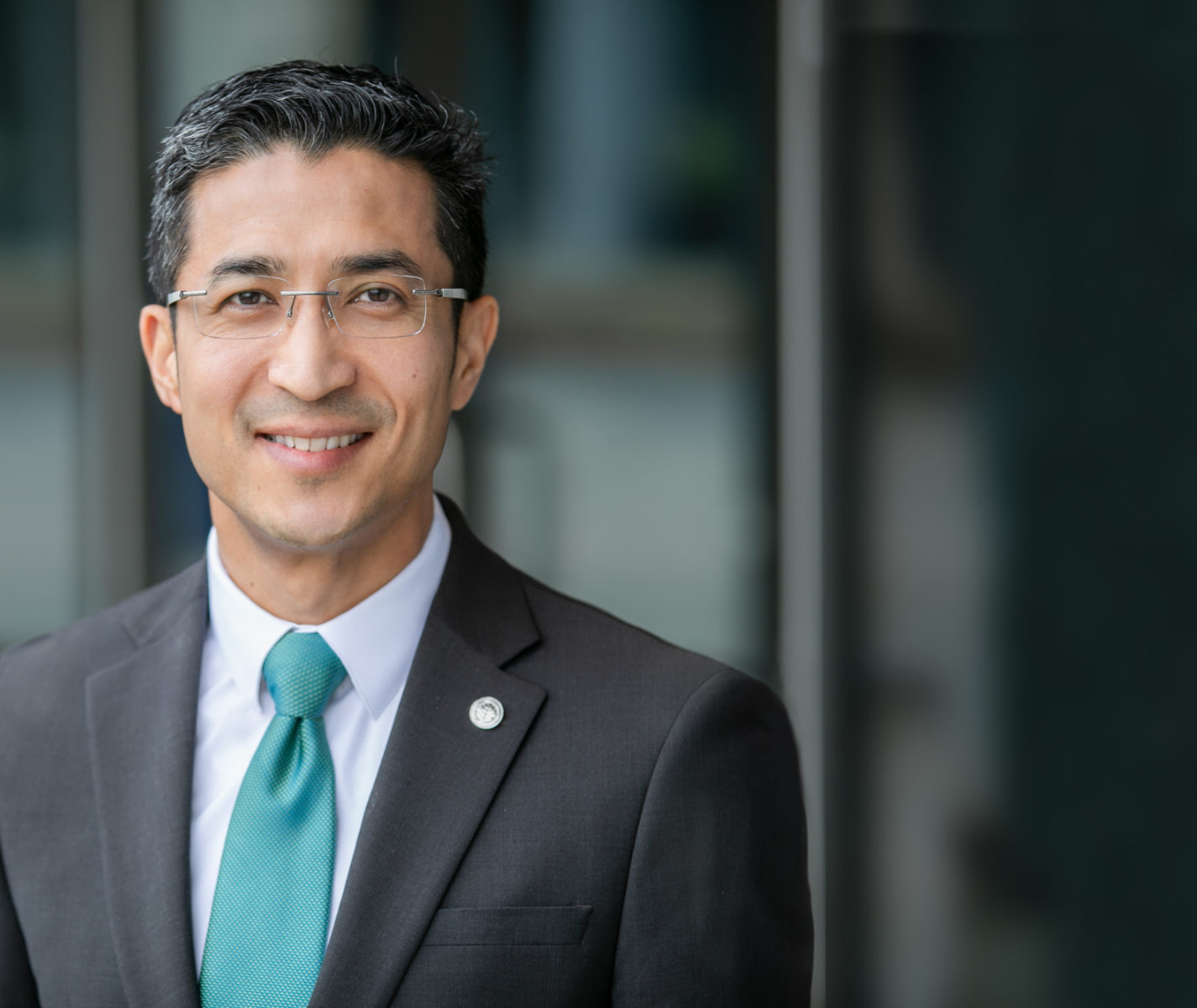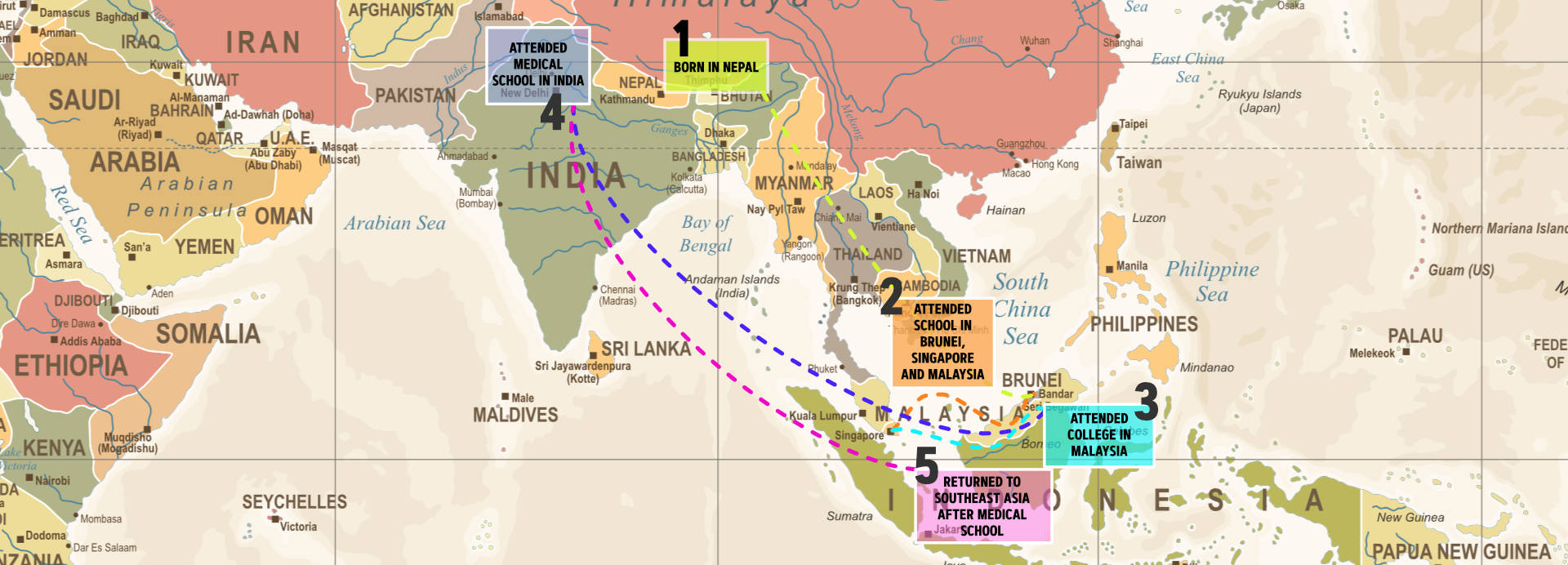Charting a New Course
PART ONE
Dr. Rasu Shrestha
Enterprise Executive Vice President & Chief Strategy and Transformation Officer
Atrium Health
As a member of the executive leadership team, Dr. Shrestha is responsible for Atrium Health’s enterprise strategy, including planning and tactical direction for the organization’s current strategic roadmap and beyond. In addition, he spearheads a renewed focus on innovation, launching new healthcare inventions, discoveries and ideas to benefit our patients and the communities Atrium Health serves. He also provides executive leadership for corporate communications and marketing, as well as enterprise data and analytics. Dr. Shrestha holds a Doctor of Medicine degree from CCS University in India. He has received training in radiology and has held a fellowship in informatics at the University of London. Shrestha also a holds a master’s degree in business administration from the Marshall School of Business at the University of Southern California.
AsiaCarolinas: Good afternoon, Dr. Shrestha. Thank you for taking time to share your thoughts and letting our readers get to know you. Let me start by saying that every time we’ve encountered the folks at Atrium Health, we’re always impressed with their professionalism and compassion. It's always been a positive experience. That's a good sign of strong leadership.
Dr. Shrestha: Thank you. Our mission here is to improve health, elevate hope, and advance healing for all. It's not just about health. It’s also about hope and healing. My goal is to make sure that positive experience is not just for one patient or that one person that we may know—it’s for everyone. That's the front that we need to continue to push forward with. The reality of needing healthcare services is that it's challenging and complex, at sometimes perhaps the most difficult time in a person's journey. How do you make a difference? How do you make sure that you're able to not just be there, but really provide that health, hope, and healing that we stand for.
AsiaCarolinas: That’s an admirable goal, but it’s got to be especially challenging to maintain that personal touch on a one-to-one, day-in-day-out basis as Atrium Health continues to grow.
Dr. Shrestha: It is both a challenge and an opportunity. The more we grow as a system, the more important it is to be tied to your mission, right? Because at the end of the day, as I lead strategy for Atrium Health, if there isn't a mission, then there isn't a strategy. So pushing forward with our culture and the mission that we have here at Atrium is even more critical as we think about broader impact and one that's sustainable and scalable.
AsiaCarolinas: You are the Enterprise Executive Vice President & Chief Strategy and Transformation Officer for Atrium Health. Aside from being a mouthful, a job title that includes “Strategy” and “Transformation” probably didn’t even exist in healthcare not so long ago.
Dr. Shrestha: That’s right. Healthcare, for the longest time, has succumbed to the status quo—the tried and tested. The adage has always been that if it's worked before, you tend to do more of it. On those principles, evidence-based guidelines and best practice clinical protocols have been tried and tested over years—centuries even. But here we are, living through this pandemic, and we can see that the status quo isn’t going to take us far enough.

When you think about strategy and transformation, it is about challenging ourselves and saying, ‘All right, where do we go from here? How do we truly impact the lives of the communities that we're a part of? How do we transform not just our organization, but our communities across the Southeast and beyond?'
And for something as personal and as challenging as healthcare especially, I think the opportunity is right in front of us to think outside the box and tackle some of the most challenging and pressing issues head-on, with bold and transformative advancements, versus incremental changes.
Healthcare is a $3.8 trillion industry in the United States, and there's so much complexity and so many challenges. How do we simplify all of this, so that we're able to really speak to the heart and the desires of that person who is at the other end of the engagement that we have as clinicians. I think it's really important to think of it from that perspective.
AsiaCarolinas: I would guess that's probably a primary reason why you have found yourself here in Charlotte. Tell us a bit about your upbringing and how your path led you here.
Dr. Shrestha: I count myself very fortunate in having not just dabbled in many cultures and being exposed to multiple languages, upbringings and religions, but to being a scholar of all of the circumstances and environments that I've been able to be a part of throughout my journey.
Dr. Shrestha's journey begins in Nepal...
 I was born in Banepa, Nepal, just outside of Kathmandu Valley not too far from the Himalayas. While Hinduism is the main religion in Nepal, it is also the birthplace of Buddha and Buddhism. So I was exposed to both Buddhist and Hindu cultures. My parents left Nepal when I’d just started school, and I primarily grew up in Southeast Asia. I spent a good part of my childhood in in the Sultanate of Brunei on the island of Borneo, which is of course Muslim.
I was born in Banepa, Nepal, just outside of Kathmandu Valley not too far from the Himalayas. While Hinduism is the main religion in Nepal, it is also the birthplace of Buddha and Buddhism. So I was exposed to both Buddhist and Hindu cultures. My parents left Nepal when I’d just started school, and I primarily grew up in Southeast Asia. I spent a good part of my childhood in in the Sultanate of Brunei on the island of Borneo, which is of course Muslim.
I also lived in Malaysia and Singapore. I attended St. Xavier’s School, a Christian school where they teach Bible studies, and then went on to St. Andrew’s School in Brunei. That was all part of the DNA of how I grew up. It was a humbling experience with such diverse exposures to various influences across humanity. I speak five languages fluently and I love the journey that I've been on.
I was the youngest student at Taylor’s College in Subang Jaya, Malaysia. I loved it. I was valedictorian and the sports captain, and after that, I received a United Nations scholarship to go to medical school. I went to India for my initial medical training at Chaudhary Charan Singh University in Meerut, Uttar Pradesh, and then got trained in radiology as I returned to southeast Asia.

Takes him to London...
I practiced there for a while, and then I left Asia to do my Informatics training at the University of London in the U.K. That was a highlight of my career, where I got exposed to the fundamentals of medical informatics and innovation. I had the opportunity to be trained by some of the top biomedical engineers in the world like Prof Rickard Kitney at Imperial College, and had the privilege to work with the likes of Dr. Nicola Strickland, who invented some of the principles that we use in medical informatics today.
That's when I started to take all of the goodness of my medical training, my passion for radiology, and my informatics training, and say, ‘All right, how do I take all of this and make a difference more than one patient at a time? How can I have a greater impact?’
That's when I went into this field that I’m in now. At that point, it was pretty new—not a lot of physicians were going into innovation and strategy and transformation. (This was three decades ago.) But I've always been an enthusiastic learner. Curiosity was always what propelled me forward. I became a doctor because I wanted to make a difference in the life of a human being. In this role as a radiologist trained in informatics and in business and in innovation, I get the opportunity to do this at scale.

...And brings him to the U.S. and Charlotte, North Carolina
From London, I came to the United States. At the University of Southern California (USC) in Los Angeles, I had the opportunity to make a difference transforming healthcare information technology in what was the largest tertiary care center in the west coast with the Los Angeles County/USC Medical Center and the Children’s Hospital Los Angeles, as well as USC University Hospital, which was the flagship Tenet hospital at that time.

If you think about all of the different cultures that I’ve had the privilege of being exposed to, and the friends that I grew up around, and when you think about diversity, equity and inclusion as we talk about it in the fabric of our everyday being here in the United States—for me, that was just life. So I think that has certainly influenced my outlook, my approach to problem-solving, my enthusiasm, and the innate sense of curiosity that I bring to everything that I tackle.
What compelled me was Gene's [Eugene Woods, Atrium Health President and CEO] vision to make an impact in the communities that we're a part of and to scale this regionally and nationally. Charlotte is one of the fastest growing cities in North America. It is the second largest financial hub in the country, and I look outside my office here at Metro close to CMC and I see the beautiful Queen City skyline. But at the same time, I'm reminded of the gap between the haves and the have-nots. We’re number 50 in upward mobility here in Charlotte, which means that if you’re born poor, chances are you remain poor. And that's not a position that we can be proud. But we have the opportunity to flatten that divide with our social impact strategies and the right public-private partnerships.
We can truly make a huge difference here in the Southeast. And we can scale this more broadly across the country, because that divide we talk about, fundamentally, is what’s wrong with healthcare in the United States. I mentioned it's a $3.8 trillion industry. Yet when you compare healthcare in the U.S. to other countries that I've been had the opportunity to live in and be a part of, we have a long way to go in terms of getting our healthcare industry to where it needs to be. I see tremendous opportunities even amidst the world-class innovations we’re creating here.
SHARE THIS PAGE
IN THE NEXT ISSUE:
In Part 2 of this interview, Dr. Shrestha details how Atrium Health is at the vanguard of dramatic change in the healthcare industry, why Charlotte is the perfect place to innovate, and why he's so excited to give us a Netflix recommendation.
